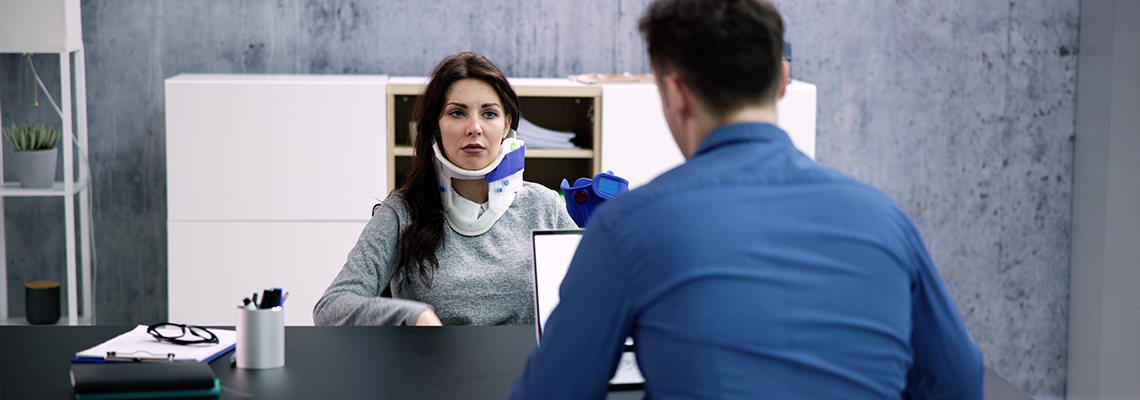LEGAL COUNSEL YOU CAN TRUST? CALL OUR TEAMS OF EXPERTS TODAY

What Should I Do If I Know the Accident Was My Fault? I Got Hurt on Someone's Property, What Should I Do?
Accidents happen, and sometimes, despite our best efforts to be careful, we find ourselves in situations where we get hurt. If you’ve been injured on someone else’s property and believe that the accident was your fault, you might feel overwhelmed and unsure about what steps to take.
At Caleb Bland Law, PLLC, we can help you understand your rights and the legal implications to help you take an informed step forward.
Understanding Liability
If you’re injured on someone else’s property, the first thing you need to understand is the concept of liability. Liability determines who is legally responsible for the accident and, consequently, who should bear the costs associated with the injury.
Even if you think the accident was your fault, you still have rights and potentially a case under certain conditions.
What Are My Rights If I Was Hurt on Someone Else's Property, but I Know It's My Fault?
The law recognizes that accidents are complex and can involve multiple factors. Just because you feel responsible for your injury doesn’t mean that you are entirely at fault from a legal standpoint.
Property owners have a duty to maintain a safe environment, and failure to do so can make them partially or fully liable for accidents that occur on their premises.
Understanding Comparative Negligence
Comparative negligence is a legal principle that comes into play when determining fault. This concept means that more than one party can be held responsible for an accident.
For instance, if you tripped and fell because you weren’t paying attention, but the property owner had left a hazardous condition unattended, both you and the property owner might share the blame.
Even If You Feel Like It's Your Fault, You May Still Have a Case
It’s crucial to understand that feeling at fault doesn’t automatically disqualify you from seeking compensation. Some situations where the property owner might still be at fault can often include:
Poor maintenance: The property owner failed to maintain the property, leading to hazardous conditions (e.g., broken steps, slippery floors).
Inadequate signage: There were no signs warning about potential dangers (e.g., wet floor signs, caution markers).
Building code violations: The property did not meet safety codes (e.g., missing handrails, insufficient lighting).
Negligent security: The property lacked adequate security measures, resulting in unsafe conditions (e.g., lack of surveillance, poorly lit areas).
Understanding these principles can empower you to take the necessary steps to protect your rights and seek appropriate compensation, even if you believe the accident was partly your fault.
Communicating With Insurance Companies
When dealing with insurance companies, avoid making statements that admit fault when speaking with insurance representatives. Insurance adjusters are trained to minimize payouts and may use your statements against you. Instead, provide factual information about the incident without offering your personal opinion on who is to blame.
Impact of Admitting Fault on a Potential Claim
Admitting fault can significantly impact your ability to receive compensation. Insurance companies may deny your claim or offer a lower settlement if you admit fault. Therefore, it’s crucial to let the investigation determine the liability.
How Your Fault Might Affect Compensation
Even if you are partially at fault, you might still be entitled to compensation. Comparative negligence laws allow you to recover damages proportionate to the other party’s responsibility. For example, if you are found to be 30% at fault and the property owner is found to be 70% at fault, you might still be able to recover 70% of the damages.
Seek Medical Help First, Then Legal Support
If you are injured on another person's property, your primary concern should always be your health. Seek medical attention immediately after the accident to address any injuries and document them properly. Medical records are crucial for any potential legal claims.
After seeking medical help, you should then consult with an experienced personal injury attorney. Legal representation is vital for several reasons:
Understanding your rights: An attorney can help you understand your legal rights and the viability of your case.
Maximizing compensation: Lawyers can negotiate with insurance companies to ensure you receive fair compensation.
Peace of mind: Knowing that a professional is handling your case allows you to focus on your recovery.
Even if you believe you are partially at fault for an accident on someone else's property, understanding your rights and seeking legal advice can help you have a fair shot at receiving the compensation you deserve.
Get Legal Guidance Today
Accidents where you get hurt on someone else’s property can be daunting, especially if you believe you are at fault. However, understanding liability, comparative negligence, and your rights can significantly impact the outcome of your case.
Always seek medical attention first; then consult with a premises liability attorney to explore your options. Remember, just because you feel responsible doesn’t mean you are entirely at fault from a legal perspective. With the right support, you can navigate this challenging time and secure the compensation you deserve.
At Caleb Bland Law, PLLC, we are committed to helping injured individuals navigate their personal injury claims. If you’ve been hurt on someone else’s property, contact us today for a free consultation. We serve clients throughout Radcliff, Shepherdsville, Bardstown, Brandenburg, Leitchfield, Hodgenville, Louisville, and many other areas in Kentucky.
